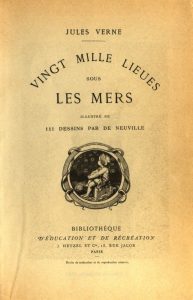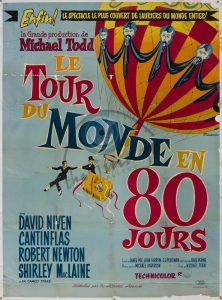“Anything one can imagine, other men can make real.” – Jules Verne, 1828-1905
Considered the Father of Science Fiction, French author Jules Gabriel Verne was a brilliant, creative writer with far-reaching imagination. His novels, including Around the World in Eighty Days, and Twenty Thousand Leagues Under the Sea, are considered revolutionary and have engaged readers for more than a century.
Born in Nantes, France, his father was a lawyer and his mother a daughter of navigators and ship-owners. Verne’s father expected him to follow him into law, but Jules was very interested in sailing and obsessed with the sea. Legend has it that when Jules was 11, he took the post of cabin boy on the Coralie, which was sailing to the Indies. His father, however, arrived just in time to grab his son off the boat and made him promise to travel “only in his imagination”. Even though we think of Jules Verne as a scientist or a world traveler, the truth is that he was neither. Much of the research for his novels was done by reading books, magazines, and talking about the scientific breakthroughs of the day with his friends.
Many of Verne’s novels predicted situations that have actually occurred in the 20th century. For example, From the Earth to the Moon (1865), predicted the Apollo space program. In the novel, a group of gun enthusiasts decides to fire a cannonball to the moon. A French daredevil volunteers to ride the cannonball, but before he can go, the group launches a cat and a squirrel to experiment (NASA used monkeys). In addition, the astronauts are shot from an enormous cannon located in Florida, very close to where the Kennedy Space Center would be constructed almost a century later. The astronauts even splash down in the Pacific, just like the Apollo astronauts would.
Another novel, published posthumously only in 1994, was considered too dark by Verne’s publisher, so it was rejected and found only in 1989 by Verne’s great-grandson. The story is set in Paris in 1960 in a world where there were skyscrapers of glass and steel, high-speed trains, gas powered automobiles, calculators, and even a worldwide communications network.
One of his best-sellers became an internationally acclaimed movie. Around the World in 80 Days produced by Michael Todd, won
an Academy Award for Best Picture of the Year, featuring David Niven and Latin comedian Cantinflas. The musical score became very popular as well. Watch the trailer here.
The works of Jules Verne influenced a many generations of scientists and science-fiction enthusiasts. Admiral Richard Byrd stated on the eve of his polar flight, “Jules Verne guides me”; William Beebe, who explored the sea in a bathysphere, attributed his interest in oceanography to reading 20,000 Leagues Under the Sea. And the late Ray Bradbury once said,”…we are all, in one way or another, the children of Jules Verne.”


Leave a Reply